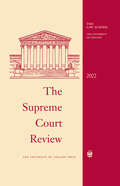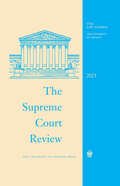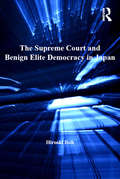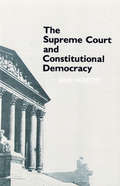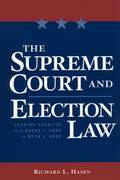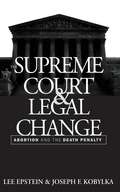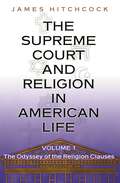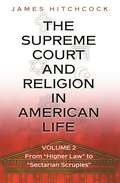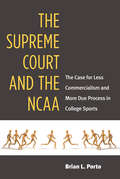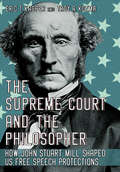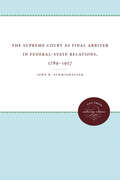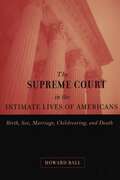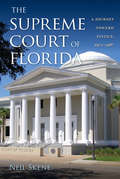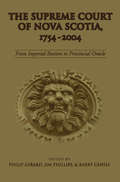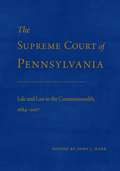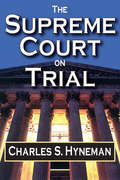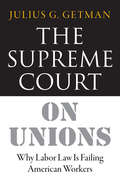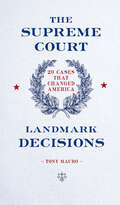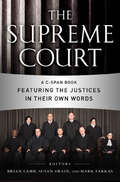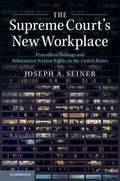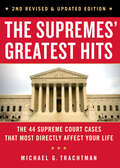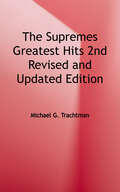- Table View
- List View
The Supreme Court Review, 2022 (Supreme Court Review)
by The University of Chicago PressAn annual peer-reviewed law journal covering the legal implications of decisions by the Supreme Court of the United States. Since it first appeared in 1960, the Supreme Court Review has won acclaim for providing a sustained and authoritative survey of the implications of the Court's most significant decisions. SCR is an in-depth annual critique of the Supreme Court and its work, analyzing the origins, reforms, and modern interpretations of American law. SCR is written by and for legal academics, judges, political scientists, journalists, historians, economists, policy planners, and sociologists.
The Supreme Court Review, 2023 (Supreme Court Review #2023)
by The University of Chicago PressAn annual peer-reviewed law journal covering the legal implications of decisions by the Supreme Court of the United States. Since it first appeared in 1960, the Supreme Court Review (SCR) has won acclaim for providing a sustained and authoritative survey of the implications of the Court’s most significant decisions. SCR is an in-depth annual critique of the Supreme Court and its work, analyzing the origins, reforms, and modern interpretations of American law. SCR is written by and for legal academics, judges, political scientists, journalists, historians, economists, policy planners, and sociologists.
The Supreme Court and Benign Elite Democracy in Japan
by Hiroshi ItohThe Constitution of Japan has served the country for more than half a century, creating and maintaining a stable and functional democratic system. This book innovatively interprets Japanese politics as a ’benign elite democracy’ whilst demonstrating the Supreme Court's vital contribution to the political structure. In The Supreme Court and Benign Elite Democracy in Japan, Hiroshi Itoh presents the first empirical study of judicial decision making under Japan's Constitution. He examines the Supreme Court’s records regarding the protection of civil rights and liberties, the preservation of the conformity of lower levels of laws and regulations to the Constitution, and the maintenance of the Court's relationships to the political branches. The analysis of these three aspects of constitutional litigation reveal how the Supreme Court contributes to the efficacy of constitutional democracy by keeping the system adaptable to the ever-changing environment in and around Japan.
The Supreme Court and Constitutional Democracy
by John AgrestoIn The Supreme Court and Constitutional Democracy John Agresto traces the development of American judicial power, paying close attention to what he views as the very real threat of judicial supremacy. Agresto examines the role of the judiciary in a democratic society and discusses the proper place of congressional power in constitutional issues. Agresto argues that while the separation of congressional and judicial functions is a fundamental tenet of American government, the present system is not effective in maintaining an appropriate balance of power. He shows that continued judicial expansion, especially into the realm of public policy, might have severe consequences for America's national life and direction, and offers practical recommendations for safeguarding against an increasingly powerful Supreme Court. John Agresto's controversial argument, set in the context of a historical and theoretical inquiry, will be of great interest to scholars and students in political science and law, especially American constitutional law and political theory. 02 In The Supreme Court and Constitutional Democracy John Agresto traces the development of American judicial power, paying close attention to what he views as the very real threat of judicial supremacy. Agresto examines the role of the judiciary in a... In The Supreme Court and Constitutional Democracy John Agresto traces the development of American judicial power, paying close attention to what he views as the very real threat of judicial supremacy. Agresto examines the role of the judiciary in a democratic society and discusses the proper place of congressional power in constitutional issues. Agresto argues that while the separation of congressional and judicial functions is a fundamental tenet of American government, the present system is not effective in maintaining an appropriate balance of power. He shows that continued judicial expansion, especially into the realm of public policy, might have severe consequences for America's national life and direction, and offers practical recommendations for safeguarding against an increasingly powerful Supreme Court. John Agresto's controversial argument, set in the context of a historical and theoretical inquiry, will be of great interest to scholars and students in political science and law, especially American constitutional law and political theory. 02 In The Supreme Court and Constitutional Democracy John Agresto traces the development of American judicial power, paying close attention to what he views as the very real threat of judicial supremacy. Agresto examines the role of the judiciary in a... In The Supreme Court and Constitutional Democracy John Agresto traces the development of American judicial power, paying close attention to what he views as the very real threat of judicial supremacy. Agresto examines the role of the judiciary in a democratic society and discusses the proper place of congressional power in constitutional issues. Agresto argues that while the separation of congressional and judicial functions is a fundamental tenet of American government, the present system is not effective in maintaining an appropriate balance of power. He shows that continued judicial expansion, especially into the realm of public policy, might have severe consequences for America's national life and direction, and offers practical recommendations for safeguarding against an increasingly powerful Supreme Court. John Agresto's controversial argument, set in the context of a historical and theoretical inquiry, will be of great interest to scholars and students in political science and law, especially American constitutional law and political theory. 02 In The Supreme Court and Constitutional Democracy John Agresto traces the development of American judicial power, paying close attention to what he views as the very real threat of judicial supremacy. Agresto examines the role of the judiciary in a...
The Supreme Court and Election Law: Judging Equality from Baker v. Carr to Bush v. Gore
by Richard Hasen&“A pioneering study of the Court&’s increasing efforts to regulate the US political system&” from the author of A Real Right to Vote (Bruce Cain, University of California, Berkeley). In the first comprehensive study of election law since the Supreme Court decided Bush v. Gore, Richard L. Hasen rethinks the Court&’s role in regulating elections. Drawing on the case files of the Warren, Burger, and Rehnquist courts, Hasen roots the Court&’s intervention in political process cases to the landmark 1962 case, Baker v. Carr. The case opened the courts to a variety of election law disputes, to the point that the courts now control and direct major aspects of the American electoral process. The Supreme Court does have a crucial role to play in protecting a socially constructed &“core&” of political equality principles, contends Hasen, but it should leave contested questions of political equality to the political process itself. Under this standard, many of the Court&’s most important election law cases from Baker to Bush have been wrongly decided. &“A must-read for anyone interested in the intersection of law and politics . . . [Hasen&’s] is an important framework against which election law scholars will react and upon which they will build for some time to come.&” —Michigan Law Review &“Hasen engagingly draws on internal Court deliberations, as well as political science and legal theory, to assess and criticize dramatic transformations in the role of constitutional law in overseeing the structure of democracy.&” —Richard H. Pildes, NYU School of Law &“A major contribution to the field of election law.&” —Thomas E. Mann, The Brookings Institution
The Supreme Court and Legal Change
by Lee Epstein Joseph F. KobylkaThe authors analyze abortion and death penalty decisions by the Supreme Court and argue that they provide prime examples of abrupt legal change. After proposing that the strength of legal arguments has at least as much impact on Court decisions as do public opinion and justices' political beliefs, they focus on the way litigators propel certain issues onto the Court's agenda and seek to persuade the justices to affect legal change.
The Supreme Court and Religion in American Life, Vol. 1: The Odyssey of the Religion Clauses (New Forum Books #33)
by James HitchcockSchool vouchers. The Pledge of Allegiance. The ban on government grants for theology students. The abundance of church and state issues brought before the Supreme Court in recent years underscores an incontrovertible truth in the American legal system: the relationship between the state and religion in this country is still fluid and changing. This, the first of two volumes by historian and legal scholar James Hitchcock, provides the first comprehensive exploration of the Supreme Court's approach to religion, offering a close look at every case, including some that scholars have ignored. Hitchcock traces the history of the way the Court has rendered important decisions involving religious liberty. Prior to World War II it issued relatively few decisions interpreting the Religious Clauses of the Constitution. Nonetheless, it addressed some very important ideas, including the 1819 Dartmouth College case, which protected private religious education from state control, and the Mormon polygamy cases, which established the principle that religious liberty was restricted by the perceived good of society. It was not until the 1940s that a revolutionary change occurred in the way the Supreme Court viewed religion. During that era, the Court steadily expanded the scope of religious liberty to include many things that were probably not intended by the framers of the Constitution, and it narrowed the permissible scope of religion in public life, barring most kinds of public aid to religious schools and forbidding almost all forms of religious expression in the public schools. This book, along with its companion volume, From "Higher Law" to "Sectarian Scruples," offers a fresh analysis of the Court's most important decisions in constitutional doctrine. Sweeping in range, it paints a detailed picture of the changing relationship between religion and the state in American history.
The Supreme Court and Religion in American Life, Vol. 2: From "Higher Law" to "Sectarian Scruples" (New Forum Books #34)
by James HitchcockSchool vouchers. The Pledge of Allegiance. The ban on government grants for theology students. The abundance of church and state issues brought before the Supreme Court in recent years underscores an incontrovertible truth in the American legal system: the relationship between the state and religion in this country is still fluid and changing. This, the second of two volumes by historian and legal scholar James Hitchcock, offers a complete analysis and interpretation of the Court's historical understanding of religion, explaining the revolutionary change that occurred in the 1940s. In Volume I: The Odyssey of the Religion Clauses (Princeton), Hitchcock provides the first comprehensive survey of the court cases involving the Religion Clauses, including a number that scholars have ignored. Here, Hitchcock examines how, in the early history of our country, a strict separation of church and state was sustained through the opinions of Jefferson and Madison, even though their views were those of the minority. Despite the Founding Fathers' ideas, the American polity evolved on the assumption that religion was necessary to a healthy society, and cooperation between religion and government was assumed. This view was seldom questioned until the 1940s, notes Hitchcock. Then, with the beginning of the New Deal and the appointment of justices who believed they had the freedom to apply the Constitution in new ways, the judicial climate changed. Hitchcock reveals the personal histories of these justices and describes how the nucleus of the Court after World War II was composed of men who were alienated from their own faiths and who looked at religious belief as irrational, divisive, and potentially dangerous, assumptions that became enshrined in the modern jurisprudence of the Religion Clauses. He goes on to offer a fascinating look at how the modern Court continues to grapple with the question of whether traditional religious liberty is to be upheld.
The Supreme Court and The NCAA: The Case for Less Commercialism and More Due Process in College Sports
by Porto Brian L.Two Supreme Court decisions,NCAA v. Board of Regents(1984) andNCAA v. Tarkanian(1988), have shaped college sports by permitting the emergence of a supercharged commercial enterprise with high financial stakes for institutions and individuals, while failing to guarantee adequate procedural protections for persons charged with wrongdoing within that enterprise. Brian L. Porto examines the conditions that led to the cases, the reasoning behind the justices' rulings, and the consequences of those rulings. Arguing that commercialized college sports should be compatible with the goals of higher education and fair to all participants, Porto suggests that the remedy is a federal statute. His proposed College Sports Legal Reform Act would grant the NCAA a limited "educational exemption" from the antitrust laws, enabling it to enhance academic opportunities for athletes. The Act would also afford greater procedural protections to accused parties in NCAA disciplinary proceedings. Porto's prescription for reform in college sports makes a significant contribution to the debate about how best to address perennial problems in college sports such as cost containment, access to a meaningful education for athletes, and fairness in rule enforcement.
The Supreme Court and the Attitudinal Model Revisited
by Jeffrey A. Segal Harold J. SpaethThis book, authored by two leading scholars of the Supreme Court and its policy making, systematically presents and validates the use of the attitudinal model to explain and predict Supreme Court decision making. In the process, it critiques the two major alternative models of Supreme Court decision making and their major variants: the legal and rational choice. Using the US Supreme Court Data Base, the justices' private papers, and other sources of information, the book analyzes the appointment process, certiorari, the decision on the merits, opinion assignments, and the formation of opinion coalitions. The book will be the definitive presentation of the attitudinal model as well as an authoritative critique of the legal and rational choice models. The book thoroughly reflects research done since the 1993 publication of its predecessor, as well as decisions and developments in the Supreme Court, including the momentous decision of Bush v. Gore.
The Supreme Court and the Philosopher: How John Stuart Mill Shaped US Free Speech Protections
by Eric T. Kasper Troy A. KozmaThe Supreme Court and the Philosopher illustrates how the modern US Supreme Court has increasingly adopted a view of the constitutional right to the freedom of expression that is classically liberal in nature, reflecting John Stuart Mill's reasoning in On Liberty. A landmark treatise outlining the merits of limiting governmental and social power over the individual, On Liberty advocates for a maximum protection of human freedom. Proceeding case by case and covering a wide array of issues, such as campaign finance, offensive speech, symbolic speech, commercial speech, online expression, and false statements, Eric T. Kasper and Troy A. Kozma show how the Supreme Court justices have struck down numerous laws for infringing on the freedom of expression.Kasper and Kozma demonstrate how the adoption of Mill's version of free speech began with Justice Oliver Wendell Holmes Jr. more than a century ago and expanded over time to become the prevailing position of the Court today. The authors argue that this embrace of Mill's rationale has led to an unmistakable reorientation in the Court's understanding of free expression jurisprudence.The Supreme Court and the Philosopher is the first book to comprehensively explore how the political philosophy of Mill has influenced the highest court in the land. In targeting the underlying philosophical reasons that explain why the modern Supreme Court renders its First Amendment decisions, this book is particularly timely, as the issues of censorship and freedom of expression are debated in the public square today.
The Supreme Court as Final Arbiter in Federal-State Relations, 1789-1957
by John R. SchmidhauserIn analyzing the Supreme Court's powers in federal-state relations, the author demonstrates that the framers of the constitution clearly intended that the Court should be the federal umpire, thus disproving a charge by modern states' righters of usurpation of power by the Supreme Court. In each historical period the effect of the Court interpretations on the autonomy of the state governments and on the acceleration of federal centralization is considered.Originally published in 1958.A UNC Press Enduring Edition -- UNC Press Enduring Editions use the latest in digital technology to make available again books from our distinguished backlist that were previously out of print. These editions are published unaltered from the original, and are presented in affordable paperback formats, bringing readers both historical and cultural value.
The Supreme Court in the Intimate Lives of Americans: Birth, Sex, Marriage, Childrearing, and Death
by Howard BallPersonal rights, such as the right to procreate--or not-- and the right to die generate dendless debate. Howard Ball shows how the Supreme Court has grappled with the right to reproduce and abort, and takes on the issue of auto-euthanasia and assisted suicide, from Karen Ann Quinlan through Kevorkian and just recently to the Florida case of the women who was paralyzed by a gunshot from her mother and who had pulled the plug on herself. For the last half of the twentieth century, the justices of the Supreme Court have had to wrestle with new and difficult life and death questions for them as well as for doctors and their patients, medical ethicists, sociologists, medical practitioners, clergy, philosophers, law makers and judges. This book offers a look at these issues as they emerged and examines the manner in which the men and women of the U.S Supreme Court adressed them.
The Supreme Court in the Intimate Lives of Americans: Birth, Sex, Marriage, Childrearing, and Death
by Howard BallChoice Outstanding Academic Title 2003 Personal rights, such as the right to procreate-or not-and the right to die generate endless debate. This book maps out the legal, political, and ethical issues swirling around personal rights. Howard Ball shows how the Supreme Court has grappled with the right to reproduce and to abort, and takes on the issue of auto-euthanasia and assisted suicide, from Karen Ann Quinlan through Kevorkian and just recently to the Florida case of the woman who was paralyzed by a gunshot from her mother and who had the plug pulled on herself. For the last half of the twentieth century, the justices of the Supreme Court have had to wrestle with new and difficult life and death questions for them as well as for doctors and their patients, medical ethicists, sociologists, medical practitioners, clergy, philosophers, law makers, and judges. The Supreme Court in the Intimate Lives of Americans offers a look at these issues as they emerged and examines the manner in which the men and women of the U.S. Supreme Court addressed them.
The Supreme Court of Florida: A Journey toward Justice, 1972-1987
by Neil Skene“A fascinating judicial study. The importance of the modern high court’s docket is so thoroughly and expertly chronicled in this book: reapportionment, courtroom cameras, personal injury, family law, environmental law, capital punishment, criminal justice, and equal justice under law.”—Thomas E. Baker, coauthor of Appellate Courts: Structures, Functions, Processes, and Personnel “A highly readable portrait of a crucial time in the history of the state high court. It brings to life the jurists and lawyers who contributed so much to contemporary Florida law.”—Mary Ziegler, author of After Roe: The Lost History of the Abortion Debate “A richly sourced, thoroughly researched, and entertaining account of one of the most significant eras in the history of what is arguably the most important (and least reported) branch of Florida government. Tells not only how the court’s decisions impact people’s lives but also how the personalities and life experience of new justices lead to evolutions in the law.”—Martin A. Dyckman, author of A Most Disorderly Court: Scandal and Reform in the Florida Judiciary “Necessary reading for anyone interested in law and politics in Florida. Makes historical figures come alive.”—Jon L. Mills, author of Privacy in the New Media Age This third volume in the history of the Florida Supreme Court describes the court during its most tumultuous years. Amid the upheaval of the civil rights movement, the Vietnam War, and Watergate, the story begins with reform in the Florida court system. It includes the court’s first black justice, Joseph Hatchett; Governor Reubin Askew’s new system for merit selection of justices; and revision of Article V, the section of the state constitution dealing with the judiciary. Neil Skene details landmark court decisions; the introduction of cameras in court; changes to media law, personal injury law, and family and divorce law; privacy rights; gay rights; death penalty cases; and the appointment of the first female justice, Rosemary Barkett. Shining a light on the often invisible work that informs the law, Skene recognizes lawyers and lower-court judges whose arguments and opinions have shaped court rulings. He integrates firsthand stories from justices with documents, articles, and cases. The result is an absorbing portrayal of a judicial institution adapting to a turbulent time of deep political and social change.
The Supreme Court of Nova Scotia, 1754-2004
by Barry Cahill Philip Girard Jim PhillipsPrepared to coincide with the 250th anniversary of the establishment of Nova Scotia's Supreme Court, this important new volume provides a comprehensive history of the institution, Canada's oldest common law court. The thirteen essays include an account of the first meeting in 1754 of the court in Michaelmas Term, surveys of jurisprudence (the court's early federalism cases; its use of American law; attitudes to the administrative state), and chapters on the courts of Westminster Hall, on which the Supreme Court was modelled, and the various courthouses it has occupied. Anchoring the volume are two longer chapters, one on the pre-confederation period and one on the modern period.Editors Philip Girard, Jim Phillips, and Barry Cahill have put together the first complete history of any Canadian provincial superior court. All of the essays are original, and many offer new interpretations of familiar themes in Canadian legal history. They take the reader through the establishment of the one-judge court to the present day ? a unique contribution to our understanding of superior courts.
The Supreme Court of Pennsylvania: Life and Law in the Commonwealth, 1684–2017 (G - Reference, Information and Interdisciplinary Subjects)
by John J. HareEstablished in 1684, over a century before the Commonwealth, Pennsylvania’s Supreme Court is the oldest appellate court in North America. This balanced, comprehensive history of the Court examines over three centuries of legal proceedings and cases before the body, the controversies and conflicts with which it dealt, and the impact of its decisions and of the case law its justices createdIntroduced by constitutional scholar Ken Gormley, this volume describes the Supreme Court’s structure and powers and focuses at length on the Court’s work in deciding notable cases of constitutional law, civil rights, torts, criminal law, labor law, and administrative law. Through three sections, “The Structure and Powers of the Supreme Court,” “Decisional Law of the Supreme Court,” and “Reporting Supreme Court Decisions,” the contributors address the many ways in which the Court and its justices have shaped life and law in Pennsylvania and beyond. They consider how it has adjudicated new and complex issues arising from some of the most notable events and tragedies in American history, including the struggle for religious liberty in colonial Pennsylvania, the Revolutionary War, slavery, the Johnstown Flood, the Homestead Steel Strike and other labor conflicts, both World Wars, and, more recently, the dramatic rise of criminal procedural rights and the expansion of tort law. Featuring an afterword by Chief Justice Saylor and essays by leading jurists, deans, law and history professors, and practicing attorneys, this fair-minded assessment of the Court is destined to become a criterion volume for lawmakers, scholars, and anyone interested in legal history in the Keystone State and the United States.
The Supreme Court on Trial
by David ListokinAlthough it was written at a time of national self-criticism, The Supreme Court on Trial remains a classic examination of the place of the Supreme Court in the American political system. When originally published, the American people were engaged in a severe examination of their basic commitments, their way of life, and the direction they appeared to be going. The contemporary literature--over the air, in newspaper editorials and columns, in books and articles--was heavy with protest, admonition, and exhortation. Although the times are different, the issues raised in this volume continue to be important.The American system exalts the American citizen as common man, with claims to the dignity of citizens, and pleas for securing their civil rights. At the same time, citizens are criticized for their cultural provincialism, fear of intellectual endeavor, and adoption of conformity. Political institutions are not immune from such evaluations. We have created Hoover commissions to study the national administrative system; the Electoral College has been the subject of persistent scrutiny since World War II. There have been demands for reconstitution of our state lawmaking bodies. What links the concerns current at the time of original publication of this volume and concerns today most obviously are deep concern we now display for the character and quality of our public school curriculum and for the administrative structure which maintains and manages our schools. The role of the Supreme Court in these concerns is evident.The purpose of the book is to examine critically the place of the Supreme Court in our political system and to improve the public understanding of what the Supreme Court does, how its acts have been received, and how its way of influencing public policy is related to other methods of making public policy.
The Supreme Court on Unions: Why Labor Law Is Failing American Workers
by Julius G. GetmanLabor unions and courts have rarely been allies. From their earliest efforts to organize, unions have been confronted with hostile judges and antiunion doctrines. In this book, Julius G. Getman argues that while the role of the Supreme Court has become more central in shaping labor law, its opinions betray a profound ignorance of labor relations along with a persisting bias against unions. In The Supreme Court on Unions, Getman critically examines the decisions of the nation's highest court in those areas that are crucial to unions and the workers they represent: organizing, bargaining, strikes, and dispute resolution. As he discusses Supreme Court decisions dealing with unions and labor in a variety of different areas, Getman offers an interesting historical perspective to illuminate the ways in which the Court has been an influence in the failures of the labor movement. During more than sixty years that have seen the Supreme Court take a dominant role, both unions and the institution of collective bargaining have been substantially weakened. While it is difficult to measure the extent of the Court’s responsibility for the current weak state of organized labor and many other factors have, of course, contributed, it seems clear to Getman that the Supreme Court has played an important role in transforming the law and defeating policies that support the labor movement.
The Supreme Court: 20 Cases that Changed America
by Tony MauroA concise, informative guide to the twenty most momentous Court rulings in American history, including excerpts from the written decisions and dissents. The legislative branch of government creates laws, and the executive branch signs and enforces them. But how does America make sure these laws don’t run afoul of the Constitution? That responsibility lies with the final arbiters: the nine justices of the Supreme Court. Every year, thousands of contentious cases are submitted to the court; only about eighty of them are heard. Out of those cases, many are remembered only by the people directly involved. But over the years, many cases heard by the Supreme Court have gone on to affect the lives of many, or even all, American citizens. In The Supreme Court: Landmark Decisions, veteran court reporter Tony Mauro picks out the twenty most momentous Supreme Court cases in United States history. In his reviews, from Marbury v. Madison, the 1803 case that first affirmed the Supreme Court’s status as the country’s final legal arbiter, to Obergefell v. Hodges, the 2015 case that legalized same-sex marriage, Mauro summarizes each case and includes cogent summaries of the justices’ decisions, as well as notable dissents. From a journalist noted by the New York Times for “explaining complex legal issues to laymen without sacrificing accuracy and subtlety,” The Supreme Court: Landmark Decisions serves as your quick, concise, and informative guide to one of the most important, and sometimes least-understood, institutions in the nation.
The Supreme Court: A C-SPAN Book Featuring the Justices in their Own Words
by Brian Lamb Susan Swain C-Span Mark FarkasThe Supreme Court grew out of an historic opportunity to interview all of the living Supreme Court justices for a C-SPAN feature documentary about the Court, the only time that the nine sitting members and their retired colleagues have granted interviews to a single television network. Eleven of those interviews-the entire current court, including the newest member, Justice Elena Kagan-are gathered here in this singular collection. In their conversations with the justices, Brian Lamb and Susan Swain bring readers into a fascinating world to which few have had access. Chief Justice John Roberts talks about the role of the Court in society, his role as chief justice, and the process of deciding cases. Justice Stephen Breyer takes us on a private tour of his chambers and describes the differences between the Court and the Congress. And new Justices Sonia Sotomayor and Elena Kagan reflect on their first impressions of the job. Through these encounters, the justices' personalities, intellects, and devotion to the Court emerge. Enriching this material are Mark Farkas's interviews with journalists, court historians, and other experts on the Court. Reporters Joan Biskupic and Lyle Denniston discuss the Supreme Court in action and the impact of a new member of the Court. Clerk of the Supreme Court William Suter illuminates the traditions of the Court. Historian James O'Hara discusses the Supreme Court building and its history. Former Solicitor General Drew Days III and attorney Maureen Mahoney describe the experience of facing the justices in fast-paced oral arguments. The Supreme Court offers readers a rare window into the nation's highest court through the eyes of those who serve there. It is absorbing reading for anyone interested in this vital and powerful institution.
The Supreme Court: Into the Third Century
by Richard Bernstein Jerome AgelA history of the Supreme Court which explores such ideas as judicial review and federalism, introduces people who have shaped our history and our law, and assesses the modern Supreme Court.
The Supreme Court’s New Workplace: Procedural Rulings and Substantive Worker Rights in the United States
by Joseph A. SeinerThe US Supreme Court has systematically eroded the rights of minority workers through subtle changes in procedural law. This accessible book identifies and describes how the Supreme Court's new procedural requirements create legal obstacles for civil-rights litigants, thereby undermining their substantive rights. Seiner takes the next step of providing a framework that practitioners can use to navigate these murky waters, allowing workers a better chance of prevailing with their claims. Seiner clearly illustrates how to effectively use his framework, applying the proposed model to one emerging sector - the on-demand industry. Many minority workers now face pervasive discrimination in an uncertain legal environment. This book will serve as a roadmap for successful workplace litigation and a valuable resource for civil-rights research. It will also spark a debate among scholars, lawyers, and others in the legal community over the use of procedure to alter substantive worker rights.
The Supremes' Greatest Hits, 2nd Revised & Updated Edition: The 44 Supreme Court Cases That Most Directly Affect Your Life
by Michael G. TrachtmanCan the government seize your house to build a shopping mall? Can it determine what control you have over your own body? Can police search your cellphone? The answers to those questions come from the Supreme Court, whose rulings have shaped American life and justice and allowed Americans to retain basic freedoms such as privacy, free speech, and the right to a fair trial. Especially relevant in light of Justice Antonin Scalia&’s passing, as President Obama gears for a fight over nominating his successor, and as we prepare to elect a new president who may get to appoint other justices, the revised and updated edition of Michael G. Trachtman&’s page-turner includes ten important new cases from 2010 to 2015. In addition, a special section features analyses of the new term rulings planned for June 2016. The new cases include:Citizens United v. Federal Election Commission (2010), which restricts the right of governments to limit campaign contributions by corporations and unions; Burwell v. Hobby Lobby (2014), which allows a religious exemption from the Affordable Care Act requirement that corporations pay for contraceptive coverage for their employees; Riley v. California (2014), which ruled that police need warrants to search the cellphones of people they arrest; and Obergefell v. Hodges (2015), which ruled that the Constitution guarantees a right to same-sex marriage.
The Supremes' Greatest Hits: The 44 Supreme Court Cases That Most Directly Affect Your Life
by Michael G. TrachtmanCan the government seize your house to build a shopping mall? Can it determine what control you have over your own body? Can police search your cellphone? <p><p>The answers to those questions come from the Supreme Court, whose rulings have shaped American life and justice and allowed Americans to retain basic freedoms such as privacy, free speech, and the right to a fair trial. <p><p>Especially relevant in light of Justice Antonin Scalia's passing, as President Obama gears for a fight over nominating his successor, and as we prepare to elect a new president who may get to appoint other justices, the revised and updated edition of Michael G. Trachtman's page-turner includes ten important new cases from 2010 to 2015. In addition, a special section features analyses of the new term rulings planned for June 2016.
